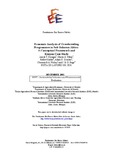| dc.contributor.author | Karugia, J T | |
| dc.contributor.author | Mwai, O A | |
| dc.contributor.author | Kaitho, R | |
| dc.contributor.author | Drucker, A G | |
| dc.contributor.author | Wollny, C B A | |
| dc.contributor.author | Rege, J E O | |
| dc.date.accessioned | 2013-04-25T11:38:04Z | |
| dc.date.available | 2013-04-25T11:38:04Z | |
| dc.date.issued | 2001-12 | |
| dc.identifier.citation | Karugia, Joseph T., Mwai, Okeyo A., Kaitho, Robert, Drucker, Adam, Wollny, Clemens B. A. and Rege, J. E. O., Economic Analysis of Crossbreeding Programmes in Sub-Saharan Africa: A Conceptual Framework and Kenyan Case Study (December 2001). FEEM Working Paper No. 106.200 | en |
| dc.identifier.other | 106.2001 | |
| dc.identifier.uri | http://hdl.handle.net/11295/16780 | |
| dc.description | Working paper | en |
| dc.description.abstract | Conventional economic evaluations of crossbreeding programmes have overestimated their benefits by ignoring subsidies, the increased costs of management such as veterinary support services, and the higher levels of risk and socio-environmental costs associated with the loss of the indigenous genotypes. A conceptual evaluation framework is developed and applied to Kenyan dairy farmers. Results suggest that at the national level crossbreeding has had a positive impact on Kenyan society's welfare, although taking into account important social cost components substantially lowers the net benefits. Farm-level performance is, however, little improved under certain production systems by replacing the indigenous zebu with exotic breeds. | en |
| dc.language.iso | en | en |
| dc.subject | Economic analysis | en |
| dc.subject | Crossbreeding | en |
| dc.subject | Programmes | en |
| dc.subject | Sub-Saharan Africa | en |
| dc.subject | Conceptual framework | en |
| dc.subject | Kenya | en |
| dc.title | Economic Analysis of Crossbreeding Programmes in Sub-Saharan Africa: A Conceptual Framework and Kenyan Case Study | en |
| dc.type | Presentation | en |
| local.publisher | Department of Agricultural Economics, University of Nairobi, Kenya | en |

